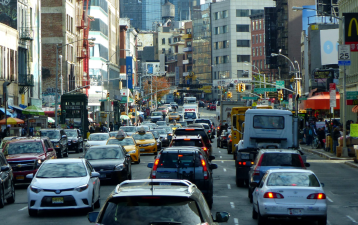Groups Dispute Quinnipiac Poll Findings on Congestion Pricing
The Campaign for New York’s Future and The Partnership For New York City both disputed findings from a Quinnipiac University poll of New Yorkers on congestion pricing. Kathryn S. Wylde, President and CEO of The Partnership for New York City released this statement:
Contrary to those who want to put their head in the sand and deny the severity of our traffic problem, this survey clearly shows that an overwhelming majority does think traffic is a serious problem. It’s unfortunate that the poll does not explain the full benefits of the Mayor’s proposal, including improved mass transit options for New Yorkers who currently lack good bus, subway, train or ferry service- which a congestion charge would pay for. Asking people if they want to pay more to drive without explaining what they are paying for doesn’t tell us anything we didn’t already know.
Gene Russianoff of NYPIRG/Straphangers Campaign, a member of the 80-plus groups in the Campaign for New York’s Future, adds:
When New Yorkers learn of the many benefits that come from congestion pricing, they become supporters. That has been the case in London and Stockholm, where initial concerns became widespread support when the benefits kicked in.
In today’s press release, the Campaign noted that the Quinnipiac survey failed to ask those polled about congestion pricing if their views would change when told that the initiative would:
- fund $31 billion dollars in very badly-need transit repairs and expansions;
- improve public health by greatly reducing air pollution; and
- fight the menace of global warming with a 30% reduction in carbon emissions.
The Campaign cited its own recent poll showing that New Yorkers respond positively to the congestion pricing plan when informed of its benefits. The poll was conducted by the firm of Penn, Schoen & Berland Associates between April 24 and April 30, 2007. Noting one example, the Campaign said that more than 70% of New Yorkers polled found it strongly or somewhat convincing when told: "The money collected through congestion pricing will raise more than half a billion dollars every year, which will be used to create more subway, bus and express bus service and make other necessary transit improvements." Similar findings were recorded when those polled where told about public health and environmental benefits.
The Campaign had two more observations about the Quinnipiac poll:
- the poll failed to tell those polled that bridge and tunnel tolls would be credited against the $8 charge, which would be the total overall charge daily.
- 90% of those polled by Quinnipiac did agree that New York City traffic is a "serious" problem; 59 percent of city voters said the problem was "very serious," while 31 percent said traffic is "somewhat serious"
Here are some relevant results from the poll conducted by Penn, Schoen & Berland Associates:

